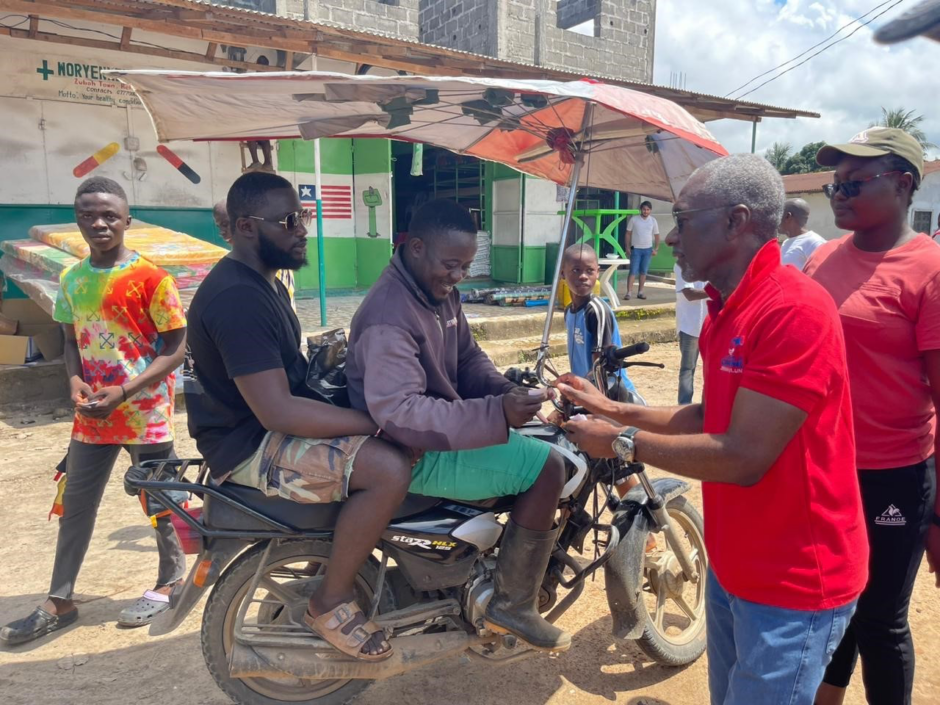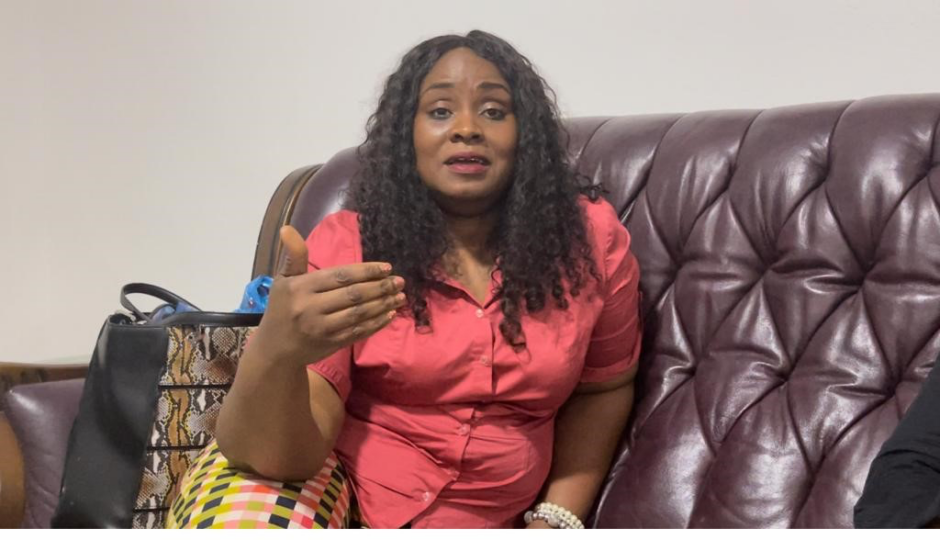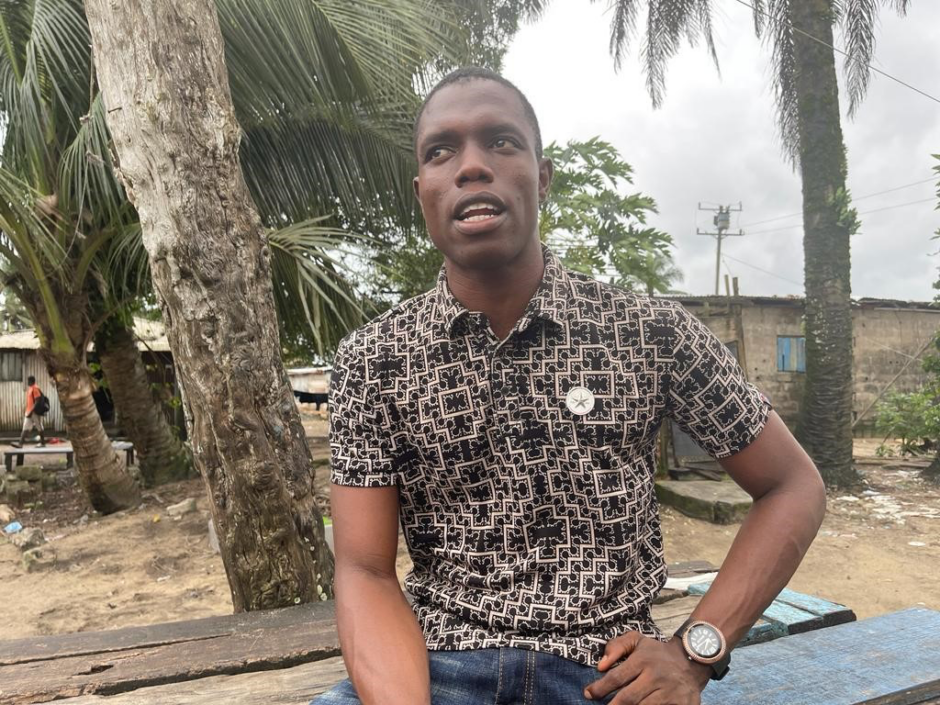
Alexander Cummings campaigns in Paynesville Credit: Gerald C. Koinyeneh, New Narratives
MONROVIA – Of the 20 contenders vying for Liberia’s presidency in this year’s elections, none comes close to the business experience of Alexander Benedict Cummings. No other Liberian, and few other Africans, have climbed so high in the global corporate world. The standard bearer of the Collaborating Political Parties made an extraordinary journey from Monrovia’s poor neighborhoods to the heights of global business as a top executive at the multinational Coca-Cola.
By Gerald C. Koinyeneh with New Narratives
In an interview in his Monrovia office Cummings, 67, said that experience, and his global business contacts, are the key to turning Liberia’s broken economy around.
“I think what distinguishes me from all the other candidates running is the fact that I have the skills and experience to fix the biggest problems affecting our country and our people. And that’s the thing called economy,” Cummings says.
But that business success was not enough to convince voters in 2017’s presidential race when he came in fifth with just 7 percent of the vote. This time around Cummings has things that eluded him last time: campaign experience, name recognition and years on the ground. Election observers are not sure it will be enough to defeat incumbent President George Weah and former Vice President Joseph Boakai. But Cummings professes confidence. If he makes the second round, he claims, he can win.
From “Point Four” to Wall Street
Cummings was born in 1956 and raised in poor neighborhoods of Monrovia’s Point Four and Fiamah. He hails from a lineage deeply rooted in education and entrepreneurship. His father, Alexander B. Cummings, Sr. was a junior minister in the Tubman government and later a priest. His mother, Ayo, a midwife and entrepreneur, shaped his early life by sending him door-to-door to collect payments from customers and keep track of sales.
After attending Demonstration Elementary School and College of West Africa high school, where he graduated as senior class president, Cummings studied at Cuttington University in Bong County and then completed his undergraduate degree in finance and economics at Northern Illinois University in the United States. Returning to Liberia, his first job was at the Liberian Development Bank (LBDI). Soon after Liberia was convulsed by riots and the 1980 military coup. Sensing dark days ahead Cummings returned to the U.S. to undertake a Master’s degree in Business Administration at Atlanta University. He spent five years with the Pilsbury Company, one of the world’s largest food companies, before joining the multinational giant Coca-Cola in 1997 as Managing Director/Region Manager for Nigeria. By 2001, he had become President and Chief Operating Officer of the company’s Africa Group, overseeing operations across 56 countries and territories.
Cummings oversaw a shift in Coca-Cola Africa’s operations from an expatriate-dominated leadership to over 70% African. He is credited with overseeing job creation, empowerment of women and the establishment of the Coca-Cola Africa Foundation, dedicated to education, healthcare, women and water in Africa. He went on to work in the U.K., Nigeria, Kenya, and South Africa.
In 2008 Cummings joined Coca-Cola’s global headquarters as Chief Administrative Officer and Executive Vice President, responsible for most of the company’s business functions across 200 countries with an operating budget of roughly $US1 billion and thousands of employees. In August 2023 Coca-Cola had a market capitalization of $US261 billion, making it the world’s 31st most valuable company. Running Liberia’s $800m budget would seem small by comparison.
“In those corporations, I didn’t have family members. You earned the promotion,” says Cummings. “These are things that I bring. Understanding how to attract investors, creating the enabling environment, understanding how businesses make money and the kind of Liberian businesses, entrepreneurs understand that delivering results on that, is where I think I will make a difference. I know how to build an economy.”

In her recollection of her first-time meeting Cummings, Dr. Richardson said he left an impression on her that led her to render support to his presidential ambition. Credit: Gerald C. Koinyeneh-NN/FPA
That extraordinary business journey has drawn many ardent admirers to Cummings’ camp.
“He is gift that is right in time for Liberia,” says Madam Yahsyndi Martin-Kpeyei, a human rights activist and CPP supporter. “Liberia is a nation that is in dire need of an economist, a manager – someone that can fix it.”
“We need a leader with vision, passion and innovation to give us the kind of country we deserve. And Alexander Cummings is the only choice to take us from grass to grace,” says Richmond Wleh, another fervent Cummings’ advocate.

Yahsyndi Martin-Kpeyei, lauds Cummings’ economic expertise. Credit: Gerald C. Koinyeneh -NN/FPA
Dr. Francien Chenoweth Richardson, a popular talk show host and professor, based in the U.S first met Cummings during his 2017 run. She has backed him ever since. “I was so impressed when he said, ‘If any of you guys that are in this room would like to support me because you are interested to get a job in Liberia or other forms of benefits, then you are in the wrong group. You are supporting the wrong person.’”
Lafayette Horatio Gould, founding chairman of the Alternative National Congress, said he and a group of break-away members of the Congress for Democratic Change (CDC), President Weah’s party, encouraged Cummings to run for president. “This is a man who understands the donor language,” Gould remembers thinking. “He could easily attract foreign direct investment to turn our country around.”
Gould tells a story of seeing Cumming’s handling of an executive member of the ANC who had been accused of financial impropriety. When found guilty, he was suspended immediately. Gould, using one of Cummings most widely used quotes, says “to predict Cummings’s future performance, he should be judged by his past performance.”
Indeed, if the election were decided by experience in economic management few Africans would hold a candle to Cummings, let alone Weah, a former soccer star with little business experience and a degree from an online university. But Gould worries Liberians don’t understand the choice.
“Unfortunately, Liberians have been making decision based on emotions, and not the real issue.”
Campaign Focus on Economy, Accountability, Education and Inclusion
Cummings vows a comprehensive overhaul of Liberia’s economy and a crackdown on corruption if elected. He promises to build an inclusive government, bringing in people of all tribes, religions, and genders, and one that empowers all qualified citizens to contribute to their country. At 27 percent, the CPP, has the highest proportion of female candidates running for the Legislature among the leading parties. Cummings’ running mate, Charlyne Brumskine, a lawyer and the daughter of former political leader Charles Brumskine, is one of only two women at the top of a leading ticket. Vice President Jewel Howard Taylor is the other.
Liberia’s appeal to international investors has taken a hit during the Weah administration according to the 2023 investment Climate Statements by the U.S. Department of State. Pervasive government corruption and the government’s willingness to unilaterally end business deals like recently blocked the $40m Liberia Traffic Management concession, even after they have been passed into law, has left a chill among investors.
Cummings underscores the importance of creating an enabling business environment.
“We got to create the environment,” says Cummings. “Nobody will come if the environment is not conducive. Because we will be attracting the right and legitimate business people. People who make their money the right and the hard way. Not black money people.”
Indeed some international investors told NN/FPA that they are excited at the prospect of a Cummings’s government.
“Electing Alexander Cummings would be a beacon of hope for Liberia’s investment climate,” says one U.S. investor who requested anonymity for fear of being expelled from Liberia. “His presidency would signal a new era of stability, innovation and opportunity, attracting capacity and fostering partnerships that will pave the way for Liberia’s future. His anticorruption stance would be a breath of fresh air for the business community which faces daily bombardment, threats and harassment from Weah’s various ministries, his inner circle and the National Investment Commission.”
Cummings says cracking down on corruption will be a priority. Scores of government officials in the last two administrations have been dismissed for corruption and never prosecuted. Cummings says that impunity will end. “There will be punishment for people who steal, who took the government’s money, no matter who you are.”
To discourage corruption Cummings says he will pay civil servants living wages. He will rationalize custom fees to facilitate trade and introduce a simplified flat-rate container fees at the Freeport of Monrovia to enhance accountability.
Cummings promises a vibrant private sector that allows Liberians to participate actively in the economy alongside foreign investment. He says reforming the Liberian economy is not complicated. The key is appointing competent professionals to key positions, simplifying import and export tax collection processes, and harnessing technology for efficiency.
Cummings says his administration will focus on ecotourism and agriculture to fuel economic growth. He will prioritize ecotourism as a job creator and income generator. He plans to empower farmers through cooperatives, transitioning them from subsistence farming to mechanized agriculture.
On education, Cummings says his administration will prioritize teacher training and development across all educational levels, from primary and secondary schools to universities. He will invest in technical and vocational training, offering young people options besides university for training in plumbing, masonry, and electrical work. He will boost adult learning to help Liberians build the skills for new jobs in the economy.
Transitional Justice
In addition to cracking down on corruption and building the economy Cummings is one of only two leading contenders to commit to holding a war crimes court to prosecute alleged perpetrators of the civil wars. (Tiawan Gongloe is the other). The court was a key recommendation of the 2009 Truth and Reconciliation Commission but neither Nobel laureate Ellen Johnson Sirleaf, who served as president for 12 years, or her successor, Weah, have supported the court’s establishment.
Cummings first backed a court during his 2017 run saying he acknowledged the contentious nature of the issue but felt it was necessary to deliver accountability and restore Liberians’ trust in their government.

Richmond Wleh says Cummings is exceptionally qualified for the presidency.
Still, critics continue to question Cummings’ lack of political experience. Joseph Walker, a Unity Party supporter, says Cummings could have been a competent president had he consented to occupy other governmental positions, such as a lawmaker or vice president, both of which Cummings has refused.
Walker points out that President Weah faced rejection by the electorate in two successive presidential bids before his eventual election. Weah only secured the presidency after serving as a senator for three years.
“If Cummings had agreed to go as a running mate to former Vice President Boakai, it would have been the only one round ticket we would have had in this election,” says Walker predicting that a Boakai-Cummings ticket would have won on the first round. “But with Cummings being on his own and Boakai on his own, Cummings should be aware that little Tiawan Gongloe could beat him up.”
Enoch Bartuah, a member of the Weah’s CDC party, says Cummings lacks an understanding of governmental intricacies, claiming the Liberian Government surpasses the complexity of “even ten” Coca-Cola companies.
Cummings has seen larger crowds in the first weeks of the campaign than last time, a sign his supporters see as hopeful. Cummings says voters have had a chance to see his rivals in office and they have seen them fail to deliver improved lives for Liberians. He is confident they will be willing to give him a go. With no public opinion polling it is difficult to assess who is leading the race. The election campaign, already plagued by turmoil, has five long weeks to go.
This story was a collaboration with New Narratives as part of the “Investigating Liberia” project. Funding was provided by the Swedish Embassy in Liberia. The funder had no say in the story’s content.
